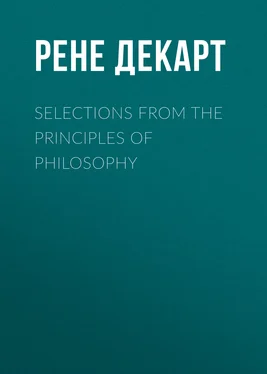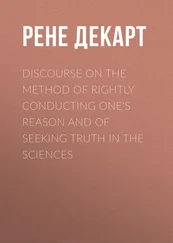Рене Декарт - Selections from the Principles of Philosophy
Здесь есть возможность читать онлайн «Рене Декарт - Selections from the Principles of Philosophy» — ознакомительный отрывок электронной книги совершенно бесплатно, а после прочтения отрывка купить полную версию. В некоторых случаях можно слушать аудио, скачать через торрент в формате fb2 и присутствует краткое содержание. Жанр: foreign_antique, Философия, foreign_edu, на английском языке. Описание произведения, (предисловие) а так же отзывы посетителей доступны на портале библиотеки ЛибКат.
- Название:Selections from the Principles of Philosophy
- Автор:
- Жанр:
- Год:неизвестен
- ISBN:нет данных
- Рейтинг книги:4 / 5. Голосов: 1
-
Избранное:Добавить в избранное
- Отзывы:
-
Ваша оценка:
- 80
- 1
- 2
- 3
- 4
- 5
Selections from the Principles of Philosophy: краткое содержание, описание и аннотация
Предлагаем к чтению аннотацию, описание, краткое содержание или предисловие (зависит от того, что написал сам автор книги «Selections from the Principles of Philosophy»). Если вы не нашли необходимую информацию о книге — напишите в комментариях, мы постараемся отыскать её.
Selections from the Principles of Philosophy — читать онлайн ознакомительный отрывок
Ниже представлен текст книги, разбитый по страницам. Система сохранения места последней прочитанной страницы, позволяет с удобством читать онлайн бесплатно книгу «Selections from the Principles of Philosophy», без необходимости каждый раз заново искать на чём Вы остановились. Поставьте закладку, и сможете в любой момент перейти на страницу, на которой закончили чтение.
Интервал:
Закладка:
Meanwhile, that it may be seen wherein I think I have already promoted the general good, I will here mention the fruits that may be gathered from my Principles. The first is the satisfaction which the mind will experience on finding in the work many truths before unknown; for although frequently truth does not so greatly affect our imagination as falsity and fiction, because it seems less wonderful and is more simple, yet the gratification it affords is always more durable and solid. The second fruit is, that in studying these principles we will become accustomed by degrees to judge better of all the things we come in contact with, and thus be made wiser, in which respect the effect will be quite the opposite of the common philosophy, for we may easily remark in those we call pedants that it renders them less capable of rightly exercising their reason than they would have been if they had never known it. The third is, that the truths which they contain, being highly clear and certain, will take away all ground of dispute, and thus dispose men's minds to gentleness and concord; whereas the contrary is the effect of the controversies of the schools, which, as they insensibly render those who are exercised in them more wrangling and opinionative, are perhaps the prime cause of the heresies and dissensions that now harass the world. The last and chief fruit of these Principles is, that one will be able, by cultivating them, to discover many truths I myself have not unfolded, and thus passing by degrees from one to another, to acquire in course of time a perfect knowledge of the whole of philosophy, and to rise to the highest degree of wisdom. For just as all the arts, though in their beginnings they are rude and imperfect, are yet gradually perfected by practice, from their containing at first something true, and whose effect experience evinces; so in philosophy, when we have true principles, we cannot fail by following them to meet sometimes with other truths; and we could not better prove the falsity of those of Aristotle, than by saying that men made no progress in knowledge by their means during the many ages they prosecuted them.
I well know that there are some men so precipitate and accustomed to use so little circumspection in what they do, that, even with the most solid foundations, they could not rear a firm superstructure; and as it is usually those who are the readiest to make books, they would in a short time mar all that I have done, and introduce uncertainty and doubt into my manner of philosophizing, from which I have carefully endeavoured to banish them, if people were to receive their writings as mine, or as representing my opinions. I had, not long ago, some experience of this in one of those who were believed desirous of following me the most closely, [Footnote: Regius; see La Vie de M. Descartes, reduite en abrege (Baillet). Liv. vii., chap. vii.—T.] and one too of whom I had somewhere said that I had such confidence in his genius as to believe that he adhered to no opinions which I should not be ready to avow as mine; for he last year published a book entitled "Fundamental Physics," in which, although he seems to have written nothing on the subject of Physics and Medicine which he did not take from my writings, as well from those I have published as from another still imperfect on the nature of animals, which fell into his hands; nevertheless, because he has copied them badly, and changed the order, and denied certain metaphysical truths upon which all Physics ought to be based, I am obliged wholly to disavow his work, and here to request readers not to attribute to me any opinion unless they find it expressly stated in my own writings, and to receive no opinion as true, whether in my writings or elsewhere, unless they see that it is very clearly deduced from true principles. I well know, likewise, that many ages may elapse ere all the truths deducible from these principles are evolved out of them, as well because the greater number of such as remain to be discovered depend on certain particular experiments that never occur by chance, but which require to be investigated with care and expense by men of the highest intelligence, as because it will hardly happen that the same persons who have the sagacity to make a right use of them, will possess also the means of making them, and also because the majority of the best minds have formed so low an estimate of philosophy in general, from the imperfections they have remarked in the kind in vogue up to the present time, that they cannot apply themselves to the search after truth.
But, in conclusion, if the difference discernible between the principles in question and those of every other system, and the great array of truths deducible from them, lead them to discern the importance of continuing the search after these truths, and to observe the degree of wisdom, the perfection and felicity of life, to which they are fitted to conduct us, I venture to believe that there will not be found one who is not ready to labour hard in so profitable a study, or at least to favour and aid with all his might those who shall devote themselves to it with success.
The height of my wishes is, that posterity may sometime behold the happy issue of it, etc.
TO THE MOST SERENE PRINCESS,
ELIZABETH, ELDEST DAUGHTER OF FREDERICK, KING OF BOHEMIA, COUNT PALATINE, AND ELECTOR OF THE SACRED ROMAN EMPIRE
MADAM,—The greatest advantage I have derived from the writings which I have already published, has arisen from my having, through means of them, become known to your Highness, and thus been privileged to hold occasional converse with one in whom so many rare and estimable qualities are united, as to lead me to believe I should do service to the public by proposing them as an example to posterity. It would ill become me to flatter, or to give expression to anything of which I had no certain knowledge, especially in the first pages of a work in which I aim at laying down the principles of truth. And the generous modesty that is conspicuous in all your actions, assures me that the frank and simple judgment of a man who only writes what he believes will be more agreeable to you than the ornate laudations of those who have studied the art of compliment. For this reason, I will give insertion to nothing in this letter for which I have not the certainty both of experience and reason; and in the exordium, as in the rest of the work, I will write only as becomes a philosopher. There is a vast difference between real and apparent virtues; and there is also a great discrepancy between those real virtues that proceed from an accurate knowledge of the truth, and such as are accompanied with ignorance or error. The virtues I call apparent are only, properly speaking, vices, which, as they are less frequent than the vices that are opposed to them, and are farther removed from them than the intermediate virtues, are usually held in higher esteem than those virtues. Thus, because those who fear dangers too much are more numerous than they who fear them too little, temerity is frequently opposed to the vice of timidity, and taken for a virtue, and is commonly more highly esteemed than true fortitude. Thus, also, the prodigal are in ordinary more praised than the liberal; and none more easily acquire a great reputation for piety than the superstitious and hypocritical. With regard to true virtues, these do not all proceed from true knowledge, for there are some that likewise spring from defect or error; thus, simplicity is frequently the source of goodness, fear of devotion, and despair of courage. The virtues that are thus accompanied with some imperfections differ from each other, and have received diverse appellations. But those pure and perfect virtues that arise from the knowledge of good alone are all of the same nature, and may be comprised under the single term wisdom. For, whoever owns the firm and constant resolution of always using his reason as well as lies in his power, and in all his actions of doing what he judges to be best, is truly wise, as far as his nature permits; and by this alone he is just, courageous, temperate, and possesses all the other virtues, but so well balanced as that none of them appears more prominent than another: and for this reason, although they are much more perfect than the virtues that blaze forth through the mixture of some defect, yet, because the crowd thus observes them less, they are not usually extolled so highly. Besides, of the two things that are requisite for the wisdom thus described, namely, the perception of the understanding and the disposition of the will, it is only that which lies in the will which all men can possess equally, inasmuch as the understanding of some is inferior to that of others. But although those who have only an inferior understanding may be as perfectly wise as their nature permits, and may render themselves highly acceptable to God by their virtue, provided they preserve always a firm and constant resolution to do all that they shall judge to be right, and to omit nothing that may lead them to the knowledge of the duties of which they are ignorant; nevertheless, those who preserve a constant resolution of performing the right, and are especially careful in instructing themselves, and who possess also a highly perspicacious intellect, arrive doubtless at a higher degree of wisdom than others; and I see that these three particulars are found in great perfection in your Highness. For, in the first place, your desire of self-instruction is manifest, from the circumstance that neither the amusements of the court, nor the accustomed mode of educating ladies, which ordinarily condemns them to ignorance, have been sufficient to prevent you from studying with much care all that is best in the arts and sciences; and the incomparable perspicacity of your intellect is evinced by this, that you penetrated the secrets of the sciences and acquired an accurate knowledge of them in a very short period. But of the vigour of your intellect I have a still stronger proof, and one peculiar to myself, in that I have never yet met any one who understood so generally and so well as yourself all that is contained in my writings. For there are several, even among men of the highest intellect and learning, who find them very obscure. And I remark, in almost all those who are versant in Metaphysics, that they are wholly disinclined from Geometry; and, on the other hand, that the cultivators of Geometry have no ability for the investigations of the First Philosophy: insomuch that I can say with truth I know but one mind, and that is your own, to which both studies are alike congenial, and which I therefore, with propriety, designate incomparable. But what most of all enhances my admiration is, that so accurate and varied an acquaintance with the whole circle of the sciences is not found in some aged doctor who has employed many years in contemplation, but in a Princess still young, and whose countenance and years would more fitly represent one of the Graces than a Muse or the sage Minerva. In conclusion, I not only remark in your Highness all that is requisite on the part of the mind to perfect and sublime wisdom, but also all that can be required on the part of the will or the manners, in which benignity and gentleness are so conjoined with majesty that, though fortune has attacked you with continued injustice, it has failed either to irritate or crush you. And this constrains me to such veneration that I not only think this work due to you, since it treats of philosophy which is the study of wisdom, but likewise feel not more zeal for my reputation as a philosopher than pleasure in subscribing myself,—
Читать дальшеИнтервал:
Закладка:
Похожие книги на «Selections from the Principles of Philosophy»
Представляем Вашему вниманию похожие книги на «Selections from the Principles of Philosophy» списком для выбора. Мы отобрали схожую по названию и смыслу литературу в надежде предоставить читателям больше вариантов отыскать новые, интересные, ещё непрочитанные произведения.
Обсуждение, отзывы о книге «Selections from the Principles of Philosophy» и просто собственные мнения читателей. Оставьте ваши комментарии, напишите, что Вы думаете о произведении, его смысле или главных героях. Укажите что конкретно понравилось, а что нет, и почему Вы так считаете.












